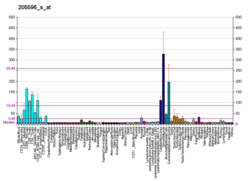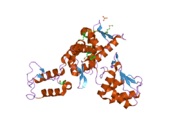SMURF2
E3 ubiquitin-protein ligase SMURF2 is an enzyme that in humans is encoded by the SMURF2 gene.[5][6]
Interactions
SMURF2 has been shown to interact with:
References
- 1 2 3 GRCh38: Ensembl release 89: ENSG00000108854 - Ensembl, May 2017
- 1 2 3 GRCm38: Ensembl release 89: ENSMUSG00000018363 - Ensembl, May 2017
- ↑ "Human PubMed Reference:".
- ↑ "Mouse PubMed Reference:".
- 1 2 3 4 Lin X, Liang M, Feng XH (Nov 2000). "Smurf2 is a ubiquitin E3 ligase mediating proteasome-dependent degradation of Smad2 in transforming growth factor-beta signaling". The Journal of Biological Chemistry. 275 (47): 36818–22. PMID 11016919. doi:10.1074/jbc.C000580200.
- ↑ "Entrez Gene: SMURF2 SMAD specific E3 ubiquitin protein ligase 2".
- 1 2 Bonni S, Wang HR, Causing CG, Kavsak P, Stroschein SL, Luo K, Wrana JL (Jun 2001). "TGF-beta induces assembly of a Smad2-Smurf2 ubiquitin ligase complex that targets SnoN for degradation". Nature Cell Biology. 3 (6): 587–95. PMID 11389444. doi:10.1038/35078562.
- 1 2 Nakano A, Koinuma D, Miyazawa K, Uchida T, Saitoh M, Kawabata M, Hanai J, Akiyama H, Abe M, Miyazono K, Matsumoto T, Imamura T (Mar 2009). "Pin1 down-regulates transforming growth factor-beta (TGF-beta) signaling by inducing degradation of Smad proteins". The Journal of Biological Chemistry. 284 (10): 6109–15. PMID 19122240. doi:10.1074/jbc.M804659200.
- ↑ Asano Y, Ihn H, Yamane K, Kubo M, Tamaki K (Jan 2004). "Impaired Smad7-Smurf-mediated negative regulation of TGF-beta signaling in scleroderma fibroblasts". The Journal of Clinical Investigation. 113 (2): 253–64. PMC 310747
 . PMID 14722617. doi:10.1172/JCI16269.
. PMID 14722617. doi:10.1172/JCI16269. - ↑ Kavsak P, Rasmussen RK, Causing CG, Bonni S, Zhu H, Thomsen GH, Wrana JL (Dec 2000). "Smad7 binds to Smurf2 to form an E3 ubiquitin ligase that targets the TGF beta receptor for degradation". Molecular Cell. 6 (6): 1365–75. PMID 11163210. doi:10.1016/s1097-2765(00)00134-9.
- 1 2 3 Lee YS, Han JM, Son SH, Choi JW, Jeon EJ, Bae SC, Park YI, Kim S (Jul 2008). "AIMP1/p43 downregulates TGF-beta signaling via stabilization of smurf2". Biochemical and Biophysical Research Communications. 371 (3): 395–400. PMID 18448069. doi:10.1016/j.bbrc.2008.04.099.
- ↑ Fukunaga E, Inoue Y, Komiya S, Horiguchi K, Goto K, Saitoh M, Miyazawa K, Koinuma D, Hanyu A, Imamura T (Dec 2008). "Smurf2 induces ubiquitin-dependent degradation of Smurf1 to prevent migration of breast cancer cells". The Journal of Biological Chemistry. 283 (51): 35660–7. PMID 18927080. doi:10.1074/jbc.M710496200.
- ↑ Carpentier I, Coornaert B, Beyaert R (Oct 2008). "Smurf2 is a TRAF2 binding protein that triggers TNF-R2 ubiquitination and TNF-R2-induced JNK activation". Biochemical and Biophysical Research Communications. 374 (4): 752–7. PMID 18671942. doi:10.1016/j.bbrc.2008.07.103.
Further reading
- Zhang Y, Chang C, Gehling DJ, Hemmati-Brivanlou A, Derynck R (Jan 2001). "Regulation of Smad degradation and activity by Smurf2, an E3 ubiquitin ligase". Proceedings of the National Academy of Sciences of the United States of America. 98 (3): 974–9. PMC 14694
 . PMID 11158580. doi:10.1073/pnas.98.3.974.
. PMID 11158580. doi:10.1073/pnas.98.3.974. - Kavsak P, Rasmussen RK, Causing CG, Bonni S, Zhu H, Thomsen GH, Wrana JL (Dec 2000). "Smad7 binds to Smurf2 to form an E3 ubiquitin ligase that targets the TGF beta receptor for degradation". Molecular Cell. 6 (6): 1365–75. PMID 11163210. doi:10.1016/S1097-2765(00)00134-9.
- Bonni S, Wang HR, Causing CG, Kavsak P, Stroschein SL, Luo K, Wrana JL (Jun 2001). "TGF-beta induces assembly of a Smad2-Smurf2 ubiquitin ligase complex that targets SnoN for degradation". Nature Cell Biology. 3 (6): 587–95. PMID 11389444. doi:10.1038/35078562.
- Subramaniam V, Li H, Wong M, Kitching R, Attisano L, Wrana J, Zubovits J, Burger AM, Seth A (Oct 2003). "The RING-H2 protein RNF11 is overexpressed in breast cancer and is a target of Smurf2 E3 ligase". British Journal of Cancer. 89 (8): 1538–44. PMC 2394340
 . PMID 14562029. doi:10.1038/sj.bjc.6601301.
. PMID 14562029. doi:10.1038/sj.bjc.6601301. - Asano Y, Ihn H, Yamane K, Kubo M, Tamaki K (Jan 2004). "Impaired Smad7-Smurf-mediated negative regulation of TGF-beta signaling in scleroderma fibroblasts". The Journal of Clinical Investigation. 113 (2): 253–64. PMC 310747
 . PMID 14722617. doi:10.1172/JCI16269.
. PMID 14722617. doi:10.1172/JCI16269. - Li H, Seth A (Mar 2004). "An RNF11: Smurf2 complex mediates ubiquitination of the AMSH protein". Oncogene. 23 (10): 1801–8. PMID 14755250. doi:10.1038/sj.onc.1207319.
- Jin YH, Jeon EJ, Li QL, Lee YH, Choi JK, Kim WJ, Lee KY, Bae SC (Jul 2004). "Transforming growth factor-beta stimulates p300-dependent RUNX3 acetylation, which inhibits ubiquitination-mediated degradation". The Journal of Biological Chemistry. 279 (28): 29409–17. PMID 15138260. doi:10.1074/jbc.M313120200.
- Brandenberger R, Wei H, Zhang S, Lei S, Murage J, Fisk GJ, Li Y, Xu C, Fang R, Guegler K, Rao MS, Mandalam R, Lebkowski J, Stanton LW (Jun 2004). "Transcriptome characterization elucidates signaling networks that control human ES cell growth and differentiation". Nature Biotechnology. 22 (6): 707–16. PMID 15146197. doi:10.1038/nbt971.
- Colland F, Jacq X, Trouplin V, Mougin C, Groizeleau C, Hamburger A, Meil A, Wojcik J, Legrain P, Gauthier JM (Jul 2004). "Functional proteomics mapping of a human signaling pathway". Genome Research. 14 (7): 1324–32. PMC 442148
 . PMID 15231748. doi:10.1101/gr.2334104.
. PMID 15231748. doi:10.1101/gr.2334104. - Suzuki Y, Yamashita R, Shirota M, Sakakibara Y, Chiba J, Mizushima-Sugano J, Nakai K, Sugano S (Sep 2004). "Sequence comparison of human and mouse genes reveals a homologous block structure in the promoter regions". Genome Research. 14 (9): 1711–8. PMC 515316
 . PMID 15342556. doi:10.1101/gr.2435604.
. PMID 15342556. doi:10.1101/gr.2435604. - Zhang H, Cohen SN (Dec 2004). "Smurf2 up-regulation activates telomere-dependent senescence". Genes & Development. 18 (24): 3028–40. PMC 535914
 . PMID 15574587. doi:10.1101/gad.1253004.
. PMID 15574587. doi:10.1101/gad.1253004. - Barrios-Rodiles M, Brown KR, Ozdamar B, Bose R, Liu Z, Donovan RS, Shinjo F, Liu Y, Dembowy J, Taylor IW, Luga V, Przulj N, Robinson M, Suzuki H, Hayashizaki Y, Jurisica I, Wrana JL (Mar 2005). "High-throughput mapping of a dynamic signaling network in mammalian cells". Science. 307 (5715): 1621–5. PMID 15761153. doi:10.1126/science.1105776.
- Ohashi N, Yamamoto T, Uchida C, Togawa A, Fukasawa H, Fujigaki Y, Suzuki S, Kitagawa K, Hattori T, Oda T, Hayashi H, Hishida A, Kitagawa M (May 2005). "Transcriptional induction of Smurf2 ubiquitin ligase by TGF-beta". FEBS Letters. 579 (12): 2557–63. PMID 15862290. doi:10.1016/j.febslet.2005.03.069.
- Ogunjimi AA, Briant DJ, Pece-Barbara N, Le Roy C, Di Guglielmo GM, Kavsak P, Rasmussen RK, Seet BT, Sicheri F, Wrana JL (Aug 2005). "Regulation of Smurf2 ubiquitin ligase activity by anchoring the E2 to the HECT domain". Molecular Cell. 19 (3): 297–308. PMID 16061177. doi:10.1016/j.molcel.2005.06.028.
- Chong PA, Lin H, Wrana JL, Forman-Kay JD (Jun 2006). "An expanded WW domain recognition motif revealed by the interaction between Smad7 and the E3 ubiquitin ligase Smurf2". The Journal of Biological Chemistry. 281 (25): 17069–75. PMID 16641086. doi:10.1074/jbc.M601493200.
- Wiesner S, Ogunjimi AA, Wang HR, Rotin D, Sicheri F, Wrana JL, Forman-Kay JD (Aug 2007). "Autoinhibition of the HECT-type ubiquitin ligase Smurf2 through its C2 domain". Cell. 130 (4): 651–62. PMID 17719543. doi:10.1016/j.cell.2007.06.050.
This article is issued from
Wikipedia.
The text is licensed under Creative Commons - Attribution - Sharealike.
Additional terms may apply for the media files.







